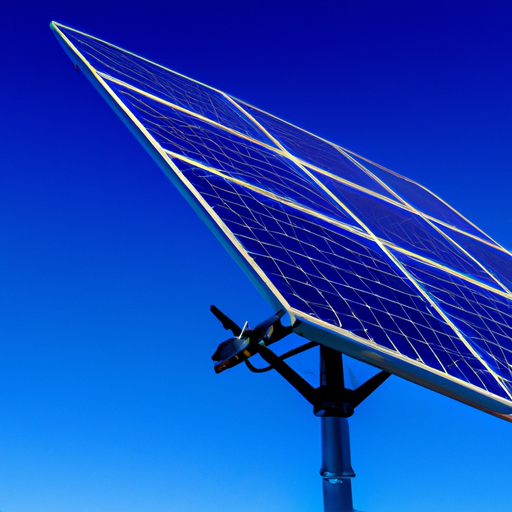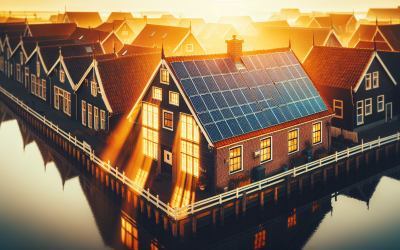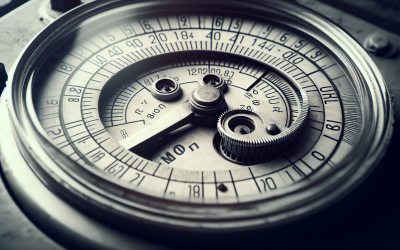So you’re wondering if you can rely on solar power when the lights go out, huh? Well, the good news is, you can! When a power outage strikes, solar power can be a lifesaver, providing you with a backup source of electricity that is clean, reliable, and sustainable. With the right solar setup in place, you can keep your essential appliances running, charge your devices, and even keep the lights on, all while reducing your reliance on the grid. In this article, we’ll explore how solar power can come to your rescue during a power outage and all the things you need to know to make the most of it. So sit tight and get ready to discover the power of the sun when darkness falls.
Introduction
Power outages can be frustrating and disruptive, leaving you without access to essential electrical appliances and lighting. In such situations, having a backup power source becomes crucial. Solar power is a popular option for many homeowners, offering a reliable and sustainable source of energy. In this article, we will explore the use of solar power during a power outage, understand its benefits and limitations, and discuss alternative energy sources.
Understanding Solar Power
Solar Power Basics
Solar power is harnessed from the sun’s energy through the use of solar panels. These panels contain photovoltaic cells that convert sunlight into electricity. The electricity generated can power your home, reducing your reliance on the grid. Additionally, excess energy generated during daylight hours can be stored in solar battery systems for use during nighttime or power outages.
Solar Panels and Inverters
Solar panels consist of multiple interconnected solar cells. When sunlight hits these cells, electrons are released, creating an electrical current. To convert this direct current (DC) into alternating current (AC) that can power your home, an inverter is used. The inverter transforms the DC electricity from the solar panels into AC electricity.
Solar Battery Systems
Solar battery systems allow homeowners to store excess energy generated during the day for later use. During a power outage, these batteries can provide a continuous power supply. They are particularly useful in areas with intermittent sunlight or when the grid is down for an extended period.
Power Outages: Causes and Impact
Causes of Power Outages
Power outages can occur due to various reasons, including severe weather conditions such as storms, earthquakes, or hurricanes. Equipment failure, tree damage, and even human error can also lead to power outages. Additionally, scheduled maintenance or repairs on the electrical grid can result in planned power outages.
Impact of Power Outages
Power outages can have significant consequences on daily life. Without power, essential appliances like lights, refrigerators, and heating systems cannot function. People who rely on powered medical equipment may face life-threatening situations. The lack of electricity also disrupts communication channels, electronic payments, and internet connectivity.
Using Solar Power During a Power Outage
Solar Power Availability
One of the advantages of solar power is its availability during a power outage. As long as the sun is shining and your solar panels are functioning correctly, you can continue to generate electricity. With the addition of a solar battery system, you can store excess energy for use at night or during power outages, ensuring a continuous power supply.
Is it Safe to Use Solar Power During a Power Outage?
Yes, using solar power during a power outage is safe, given that your solar power system is properly configured and installed. However, it is crucial to follow safety guidelines provided by the manufacturer and consult professional installers to ensure your system is functioning safely.
Components Needed to Use Solar Power During a Power Outage
To effectively use solar power during a power outage, you will need a solar panel system, an inverter, and a solar battery system. The solar panels and inverter generate and convert solar energy into electricity, while the solar battery system stores excess energy for backup power.
Preparing for a Power Outage
Installing a Solar Power System
Installing a solar power system involves engaging professional installers who will evaluate your home’s energy needs, calculate the appropriate number of solar panels, and install the system. Proper installation ensures optimal performance and longevity of the solar power system.
Choosing a Solar Backup System
When selecting a solar backup system, consider the capacity and duration of backup power required during a power outage. Discuss your needs with the installer to determine the suitable size and capacity of the solar battery system. Additionally, ensure that the backup system is compatible and integrates seamlessly with your existing solar power system.
Maintaining Your Solar Power System
Regular maintenance of your solar power system is essential to maximize its efficiency and lifespan. This includes cleaning the solar panels, checking for any damage or debris, and ensuring the inverter and battery connections are secure. Periodic inspections by qualified professionals can help detect and resolve any issues promptly.
Benefits of Using Solar Power During a Power Outage
Uninterrupted Power Supply
Having a solar power system with a battery backup ensures an uninterrupted power supply during a power outage. This means critical appliances like refrigerators, medical equipment, and lights can continue to operate, providing safety, comfort, and peace of mind.
Reduced Dependency on the Grid
Using solar power during a power outage reduces your dependency on the grid. By generating and storing your own electricity, you become less reliant on utility companies and the stability of the electrical grid. This independence can protect you from extended outages and potential price increases.
Environmental Impact
Solar power is a clean source of energy that produces no greenhouse gas emissions during operation. By utilizing solar power during a power outage, you contribute to reducing carbon footprint and minimizing environmental impact. It is a sustainable alternative to traditional fossil fuel-based generators.
Considerations and Limitations
Capacity and Duration of Backup Power
When considering solar power for backup during a power outage, it is important to assess your energy needs. The capacity and duration of backup power depend on the size of the solar power system and the capacity of the battery storage. It is crucial to work with professionals to determine the appropriate system size for your requirements.
Weather Conditions and Sunlight Availability
The effectiveness of solar power during a power outage can be affected by weather conditions and sunlight availability. Overcast skies or prolonged periods of rain can reduce the amount of energy generated by solar panels. Assess the prevailing weather conditions in your area when considering solar power for backup during a power outage.
Cost and Affordability
The cost of installing a solar power system, including the necessary components for backup during a power outage, should be taken into account. The initial investment might be higher than traditional backup options like fuel generators. However, with potential savings on electricity bills and long-term environmental benefits, solar power proves to be a cost-effective and socially responsible choice.
Alternative Energy Sources for Power Outages
Wind Power
Wind power utilizes wind turbines to generate electricity. Just like solar power, it provides a renewable energy source. However, wind power requires consistent wind patterns to generate electricity effectively. In areas with a steady wind supply, wind power can be a viable alternative to solar power for backup during a power outage.
Hydro Power
Hydro power harnesses energy from flowing water to generate electricity. Large-scale hydroelectric power plants are commonly used to provide electricity to cities and towns. However, for individual homeowners, utilizing hydro power for backup during a power outage might not be feasible due to the need for a water source with sufficient flow and drop.
Fuel Generators
Fuel generators are a traditional option for backup power during a power outage. These generators run on fuel, such as gasoline or diesel, and can provide immediate power. However, they come with drawbacks such as noise, maintenance requirements, and environmental impact due to emissions.
Conclusion
Solar power offers a reliable and sustainable solution for backup power during a power outage. By understanding the basics of solar power, preparing your home with the necessary components, and considering the benefits and limitations, you can make an informed decision about whether solar power is the right choice for you. Additionally, exploring alternative energy sources like wind power, hydro power, and fuel generators allows you to evaluate and select the backup option that best suits your needs. Embracing these green and resilient alternatives can provide peace of mind and ensure uninterrupted power supply, even in the face of unexpected outages.









